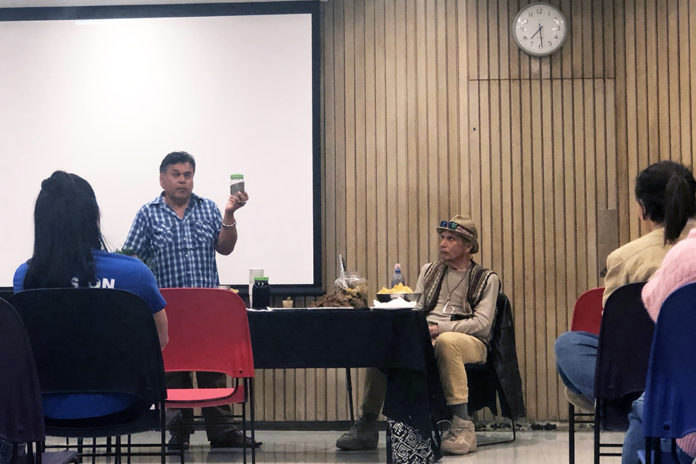
Students gathered in Lower Herrick the evening of March 28 to learn about Native American food systems and cultures from Abe Sanchez and Craig Torres of the Chia Café Collective, a grassroots organization dedicated to honoring the Indigenous people of Southern California and their connections to nature and native plants, according to their cookbook.
Celestina Castillo, director of the Center for Community Based Learning (CCBL) and professor Raney of the kinesiology department organized the event. The event was a component of professor Raney’s “Nutrition and Homeostasis” course. Raney’s research focuses on health disparities in Los Angeles; although the course centers on nutrition generally, cultural and ethnic health disparities are a central component of the curriculum, according to Raney.
Raney said the event’s intention was to focus on how indigenous peoples of Southern California are making efforts to return to their healthy eating habits. Although the Native American population presently has one of the highest rates of obesity and diabetes, according to Raney, their diet used to be focused on a multitude of plants, such as chia, mesquite and cactus.
“Everyone has a connection to food, it‘s a really easy way to bring people together,” Raney said. “But understanding how culture also influences food is really important, and how certain cultures have lost their connection to history but now are trying to revitalize it — this is what Craig and Abe from the Chia Café Collective do. They try to bring back the realization and appreciation for what [has been] part of that culture from the very beginning.”
Torres is a member of the Tongva Tribe, the indigenous people of the Los Angeles basin. He is a cultural educator, presenter and consultant for schools, museums, nature centers and government agencies, as well as an artist featured on UCLA’s Mapping Indigenous LA website. Sanchez is a member of the Purepecha tribe. He works with scholars and culinary experts to learn culinary methods and cultural practices to combine with his years of research and experience with traditional foods. According to Castillo, the sustainable foods Sanchez engages with are widely available, yet underused.
Sanchez’s goal is to advocate for the decolonization of diets by promoting the cooking of native Californian and southwest plant-based foods, according to Castillo. In his introduction, Castillo articulated Sanchez’s belief that teaching about ancient foods and helping people learn ways of gathering and preparing them again will make a significant difference in our health and the health of the environment. This sentiment of reconnecting with and respecting the environment was the focus of the talk.
The Chia Café Collective, which also has a cookbook, is indeed about plants, but it is also about relationships to nature, Torres said.
“[The Chia Café Collective] is about knowing what that plant offers, knowing how we sustain ourselves,” Torres said. “For me, it is impossible to start learning about plants before you develop a relationship with it and have that reciprocity with it, because [otherwise] it becomes exploitation and commodification when you [just] learn about a plant.”
A large part of the mission of the Chia Café Collective is to encourage people to look at plants as relatives and not resources that humans can exploit and commodify, according to Torres.
Torres emphasized the degree to which the notion of nature is ingrained in the Tongva culture, explaining that the tribe did not have a word that translated to “nature.” When he asked the audience why they think that may have been, one student offered that it may be because nature is not a separate entity from their human selves. Torres affirmed that this was exactly why.
On a slide depicting some of the plants that traditionally composed Indigenous Southern Californians’ diets, Torres and Sanchez intentionally included images of animals such as deer and birds surrounding the healing elderberry.
“If I look at [the elderberry] as what this plant gives us then it would be human-centric for me to just think about my relationship with the plant,” Torres said. “So I started putting these animals, these relatives in here, like the deers and birds, have a relationship with the plant. [If] you take one of them out of there, it will affect the biology of that landscape.”
In the latter half of the event, Sanchez presented a slideshow depicting numerous plants traditionally used in Indigenous cooking that the Chia Café Collective is trying to reintroduce to people’s diets. He noted how cactus specifically has been deemed by some as “the next kale.”
Sanchez recently traveled to Europe for an international gathering of wood carvers, and through conversations with attendees, noticed that although The Chia Café Collective specifically works with Native American people, the revitalization of crafts and food are happening all around the world.
A previous version of this article misspelled Prof. Marcella Raney’s last name. It has been changed from “Rainey” to Raney.
![]()



































